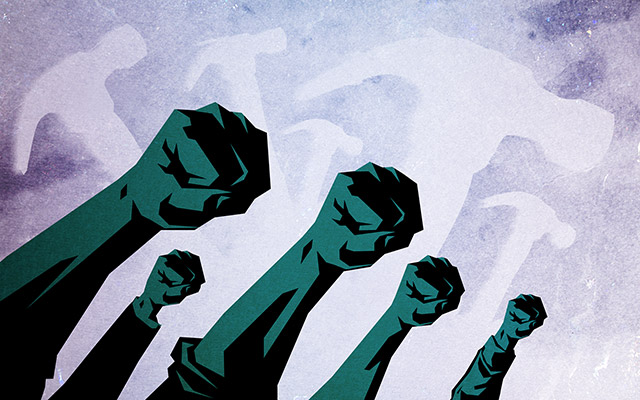
Did you know that Truthout is a nonprofit and independently funded by readers like you? If you value what we do, please support our work with a donation.
Probably it’s my age showing, but my taste in music is completely stuck in the mud. I see these new singers being promoted on TV, and I’ve never heard of a single one of them. Even my refuge radio station is getting weird on me. I was in the car the other day listening to WZLX, the classic rock station out of Boston, and they played “Jane Says” by Jane’s Addiction. I almost drove off the road. That’s not classic rock! That’s my music! I was annoyed, until I remembered that “Jane Says” came out 29 years ago, and then I was annoyed and a little sad.
Know what else is stuck in the mud, and has been for about the same amount of time? Wages. Your wages, mine, and just about everyone else’s — 70 percent of workers in the US — haven’t changed much at all for decades. Adjusted for inflation, your upward mobility and ability to save for the future are pretty much right where they were when Jane first said what she had to say.
They say time flies. When it comes to the so-called American Dream, however, time has been standing still.
The fact that wages in this country have not improved for two generations running has a whole lot to do with the ongoing and highly successful campaign fought against labor unions by the bosses of the world, including the one who’s currently running the country. Today, only about 13 percent of US households are made up of union workers. The decline in the ranks of labor unions matches with cold precision the overall decline of the nation itself.
Unions represent and fight for what the United States should be, and more importantly, serve as a vital bulwark against the atrocities of this country’s early labor history, right from its colonial beginnings. The 17th century aristocrat with the tobacco plantation — constructed on stolen land — profited largely from the labor of enslaved Africans, enslaved or indentured Indigenous people, as well as that of unpaid laborers scraped from the lowest rungs of British society. Both cases created profit for the few, with toil and misery for the many. That struggle, in one form or another, has been going on ever since. Organized labor has been a key component of the resistance to that old, ugly formula.
During the 2016 presidential campaign, one could not go more than a day without hearing candidate Trump rail about empty factories dotting the landscape like tombstones. This was, to put it mildly, a hoot, because it was his wealthy friends and their parents, and their parents’ parents, who intentionally obliterated the manufacturing industry in the United States.
For many years, labor unions held the line against ownership’s greed and actually made sure a factory worker could support a family. Their influence was growing, and that influence had to be stymied if profits were to be maximized. By deliberately sending our nation’s manufacturing core — steel, textiles, etc. — overseas, where wages were lower, ownership pulled a checkmate move against labor unions, kneecapping their power.
They didn’t care if such an act shattered the economy for the rest of us, because they still got paid. More importantly to them, they chopped down broader union influence with brutal effect. How are you going to organize if there are no more jobs? There’s always work at Walmart, because ours is now a service economy — but don’t try to unionize.
Over a quarter of the nation’s workers were in a union before Ronald Reagan famously fired more than 11,000 air traffic controllers and crushed their union in 1981. After that, Reagan stacked the National Labor Relations Board (NLRB) with avowed union-haters, which made screwing your workers easier and safer than getting the mail. Union enrollment plummeted after that, the years rolled by, wages stagnated, and none of it was an accident.
The first rule of non-union workers is, “The bosses don’t care about you, you are disposable.” They wrecked a very good economic model on purpose rather than live in a country where laborers can organize for a real living wage, and that is Pennsylvania steel-bound fact. They destroyed the village in order to save it … for themselves.
When it comes to wages and unions, we have all been trapped in a kind of feedback loop. It is this way because it has always been this way and will always be this way, because that’s the way it is. Everything stays the same, including your sorry paycheck and your deflated opportunities for a better life.
If I had a hammer, I would smash that stilted owner-positive paradigm to shards and flinders.
Wait, I do have a hammer.
See, I’m in a union, an unusual thing these days. Some brave souls organized our shop years ago, and were able to succeed. Not every workplace that attempts unionization is able to follow this path. The problem is not that workers don’t want to unionize. The problem is that the act of trying to unionize is practically revolutionary these days, and the forces arrayed against those who would organize are aggressive, repressive, well-funded and also organized themselves. Unionizing is not easy — anything worth doing seldom is — and often comes with danger, but unions, collective worker strength, is our hammer. It’s time to pick it up and swing it again.
Happy Labor Day.
Media that fights fascism
Truthout is funded almost entirely by readers — that’s why we can speak truth to power and cut against the mainstream narrative. But independent journalists at Truthout face mounting political repression under Trump.
We rely on your support to survive McCarthyist censorship. Please make a tax-deductible one-time or monthly donation.